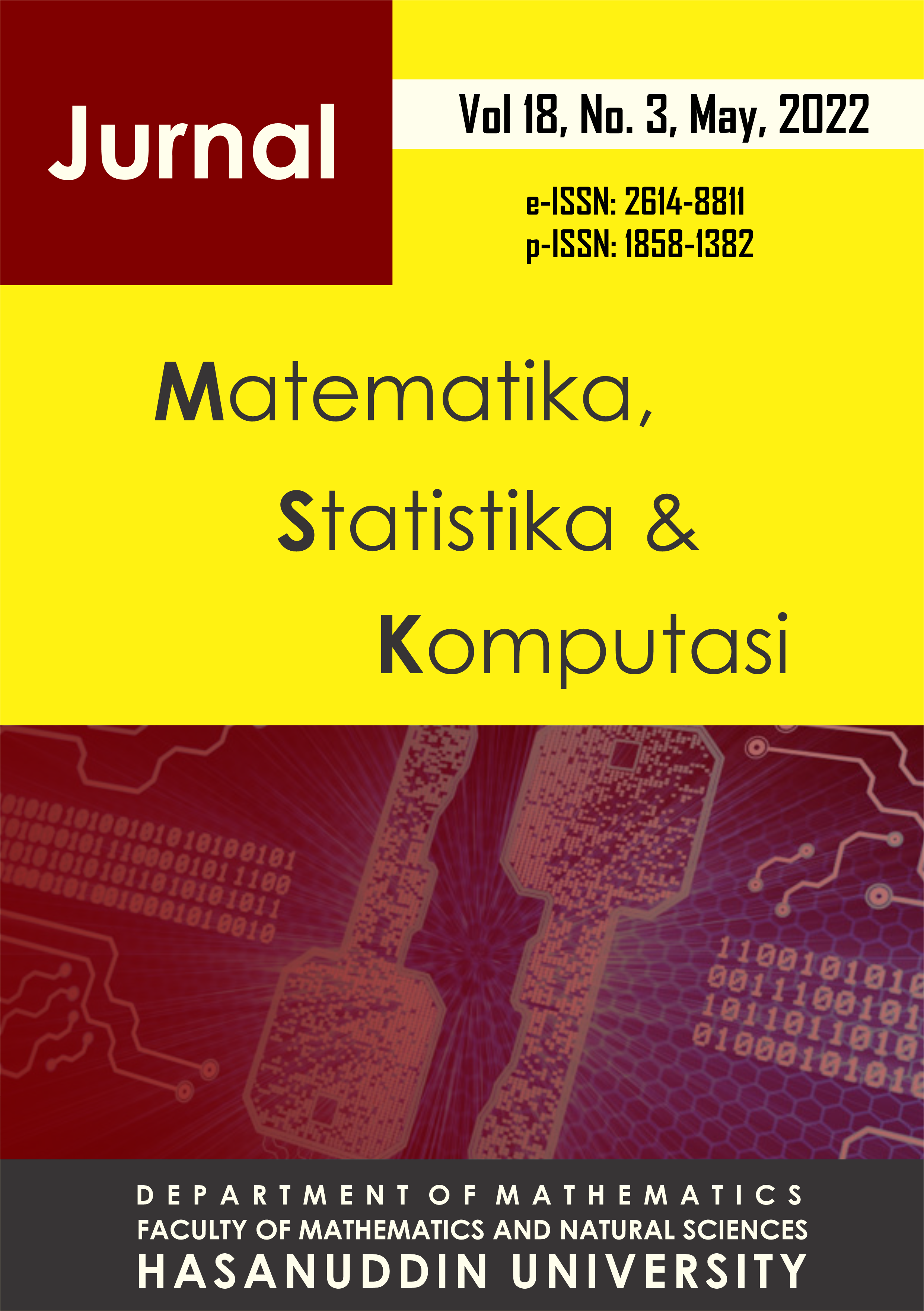Stability Analysis of Tuberculosis Spread Model Co-Infected Diabetes Mellitus with DOTS Strategy
DOI:
https://doi.org/10.20956/j.v18i3.19523Keywords:
Equilibrium point, Basic Reproduction Number, Tuberculosis, Diabetes Mellitus, Treatment with DOTSAbstract
Tuberculosis (TB) is an infectious disease caused by the bacterium Mycobacterium tuberculosis. Patients with symptoms of TB can be caused by immune disorders such as diabetes mellitus infection. Patients with diabetes mellitus can affect the clinical symptoms of TB patients and are associated with a slow response to TB treatment. This study aims to analyze and determine the stability of the equilibrium point of the TB disease spread model coinfected with DM by considering nine compartments, namely susceptible TB without DM, exposed TB without DM, infected TB without DM, recovered TB without DM, susceptible TB with DM, exposed TB with DM, infected TB with DM, recovered TB with DM, and treatment with DOTS. The research method used is a qualitative method by determining the basic reproduction number obtained with next generation matrix method to analyze the stability of the non-endemic and endemic equilibrium points. The non-endemic and endemic equilibrium points are said to be locally asymptotically stable if , and unstable if .The results obtained from sensitivity analysis show that the spread of disease can be reduced and eliminated if treated with DOTS in the infected compartment.
References
Beay, L. K., Kasbawati & Toaha, S., 2017. Effects of human and mosquito migrations on the dynamical behavior of the spread of malaria AIP Conference. Proceedings 1825, 020006.http://doi.org/10.1063/1.4978975.
Driessche. & Watmough., 2002. Reproduction numbers and sub-threshold endemic equilibria for compartmental models of disease transmission. Mathematical Biosciences. Vol. 2002, No. 180, hal 29-48.
Hartati, H., Toaha, S. & Kasbawati., 2019. Stability analysis of SEISEIR-SEI modelling on the dynamics of spread dengue fever with vaccination and insectiside. J. Phys. : Conf. Ser. 1341 062033. doi:10.1088/1742-6596/1341/6/062033.
Inayah, S., 2019. Penanggulangan Tuberkulosis Paru dengan Strategi DOTS. Higeia Journal of Public Health Research and Development. doi : https://doi.org/10.15294/higeia/v2i3/25499.
Malik, M. D., 2018. Mathematical modelling and numerical simulation of tuberculosis spread with diabetes effect. Jurnal of Phisics : Conference Series. doi : 10.1088/1742-6596/1108/1/012061.
Mahtofani, P. E., 2020. Faktor-faktor yang berhubungan dengan kejadian penyakit tuberkulosis (tb) paru di wilayah kerja puskesmas serang kota tahun 2019. Jurnal Ilmiah Kesehatan Masyarakat. doi : https://doi.org/10.52022/jjkm.v12i1.53.
Miharja, L., 2015. The prevalence of diabetes mellitus in tuberculosis and the treatment problems. Jurnal Ekologi Kesehatan. Vol 14.
Muin, R. M., Toaha, S. & Kasbawati, 2019. Effect of vaccination and treatment on the MSEICR model of the transmission of hepatitis B virus. J. Phys.: Conf. Ser. 1341 062031. doi : 10.1088/1742-6596/1341/6/062031.
Murray, J. D., 2012. Mathematical Biology I. An Intriduction (Third Edition ed). New York, USA : Springer.
Sileshi, B., 2018. Association between diabetes mellitus and multi-drug-resistant tuberculosis. National Library of Medicine. doi : 10.1186/s13643-018-0828-0.
Siyu, L. B., 2020. Modelling and dynamic analysis of tuberculosis in mainland China form 1998 to 2017 : the effect of DOTS strategy and further control. Theoretical Biology and Medical Modelling. doi : 10.1186/s12976-020-00124-9.
Toaha, S., 2013. Pemodelan Matematika dalam Dinamika Populasi. Makassar : Dua Satu Press.
Wijaya, I., 2015. Tuberkulosis paru pada penderita diabetes mellitus. Continuing Medical Education. Vol 42.
Willems, J. L., 1970. Stability Theory of Dynamical System. London : Thomas Nelson & Sons.
Wiraningsih, E. D., Aryati, W. L., Toaha, S. & Lenhart, S., 2010. Optimal control for SEIR rabies model between dogs and human with vaccination effect in dogs. Proceedings of the 6th IMT-GT Conference on Mathematics, Statistics and its Applications (ICMSA2010) Universiti Tunku Abdul Rahman, Kuala Lumpur, Malaysia. Vol. 6. 1161-1175.
Wiraningsih, E. D., Agusto, F., Aryati, L., Lenhart, S., Toaha, S., Widodo & Govaerts, W., 2015. Stability analysis of rabies model with vaccination effect and culling in dogs. Applied Mathematical Sciences, 9(77), 3805-3817. doi : 10.12988/ams.201553197.
Downloads
Published
How to Cite
Issue
Section
License
Copyright (c) 2022 Author and publisher

This work is licensed under a Creative Commons Attribution 4.0 International License.

This work is licensed under a Creative Commons Attribution 4.0 International License.
Jurnal Matematika, Statistika dan Komputasi is an Open Access journal, all articles are distributed under the terms of the Creative Commons Attribution License, allowing third parties to copy and redistribute the material in any medium or format, transform, and build upon the material, provided the original work is properly cited and states its license. This license allows authors and readers to use all articles, data sets, graphics and appendices in data mining applications, search engines, web sites, blogs and other platforms by providing appropriate reference.







